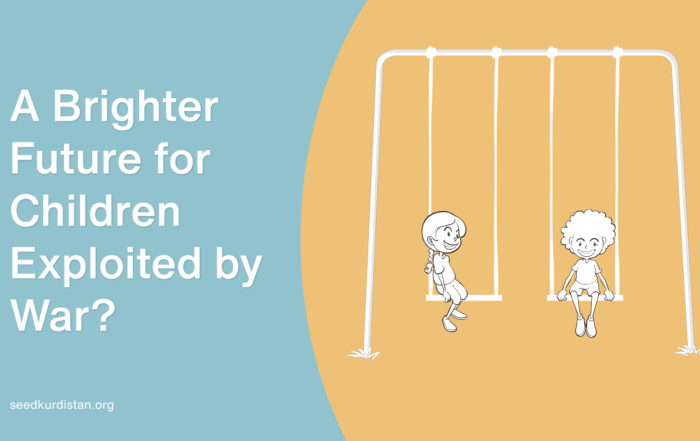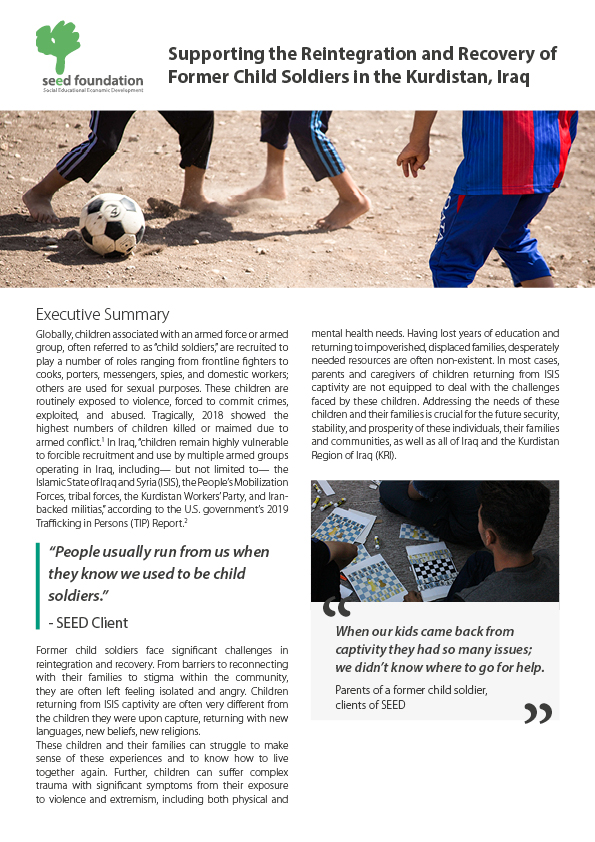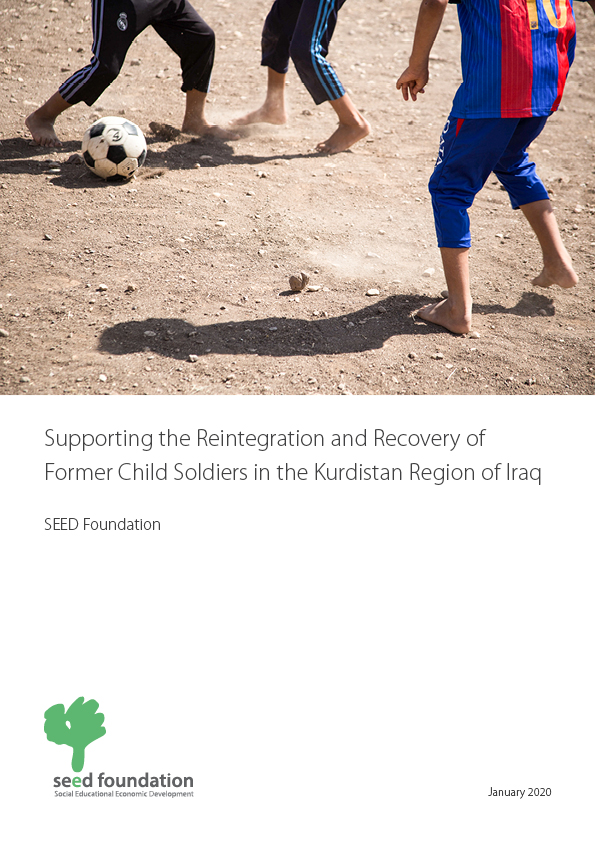Supporting the Recovery and Reintegration of Former Child Soldiers
While the Government of Iraq and the UN continue to collaborate through the Monitoring and Reporting Mechanism (MRM) Country Task Force on the development of an action plan to prevent recruitment and support reintegration of children associated with armed forces and groups (CAAFAG), there is currently no policy or legal framework in place to guide the national response to these children in Iraq. In the absence of such a framework, over the past six years, it has largely fallen to humanitarian and protection actors to provide rehabilitative services and promote the social and communal reintegration of CAAFAG, often on an individualized and ad hoc basis. To strengthen the response of service providers operating in Iraq and the Kurdistan Region, SEED Foundation released today 2 February 2021 a report detailing the unique needs of this highly vulnerable subset of Iraq’s conflict-affected children.
ISIS committed grave violations and abuses against thousands of children in Iraq, including abduction, rape and other forms of sexual violence, killing and maiming, and recruitment for use as child soldiers. Child survivors of ISIS atrocities, especially those exploited for war purposes in any capacity, require comprehensive and long-term support that is child-centered and rights-based to overcome physical injuries, psychological traumas, and stigma from alleged association with ISIS, and to reintegrate into society with dignity. Failing to protect these children from further harm and ignoring their unique needs may increase reliance on negative coping mechanisms and informal structures among this demographic, and result in serious detriment to social cohesion and sustainable peace in Iraq.
In the report, SEED Foundation proposes feasible recommendations to address the legacy of ISIS atrocities against children by protecting child survivors from further violations and harm, thereby promoting human flourishing, supporting deradicalization, and preventing re-recruitment. This report is part of SEED’s advocacy series on supporting the reintegration and recovery of survivors of ISIS, in line with a reaffirmation of the human rights and dignity of conflict-affected children.
Children who were held in ISIS captivity continue to suffer from complex traumas. Many children were coerced by ISIS to learn a new language, convert to a new religion, or adopt extreme beliefs as part of ISIS’ genocidal strategy to eradicate their identity and native culture. In post-captivity life, these highly vulnerable survivors face a range of serious challenges in their quest to recover and reintegrate into society:
As a local NGO, SEED mobilized in 2014 to join local and international efforts to meet the dire needs of displaced individuals and groups fleeing from ISIS’ reign of terror. Between 2014 and 2019, SEED supported the recovery and reintegration of 43 former child soldiers, along with their families, caregivers, and communities, through our comprehensive service delivery programs, including critical mental health and psychosocial support (MHPSS) services. These services help child survivors, who were exposed to extremist ideology or coerced to participate in ISIS atrocities, to gradually heal from their traumas, reestablish their individual identities, reclaim the right to a dignified childhood, and reconnect with their families and civilian life.
National and local authorities in Iraq must support these ongoing efforts to address the needs of conflict-affected children as an integral part of rebuilding the country’s stability and social cohesion. Failing to meet the needs of survivors of ISIS atrocities due to structural discrimination and deprivation can exacerbate real and perceived disenfranchisement, marginalization, isolation, and long-standing grievance. Such outcomes can undermine national and international efforts to sustain peace in Iraq, and may lay the building blocks for future political tension and further episodes of large-scale conflict.
This research paper presents promising practices, informed by SEED’s extensive field experience and relevant literature, for providing services to child survivors of ISIS atrocities, including those who were exploited as child soldiers, and recommends ways to overcome some of those considerable challenges.
SEED is grateful for all individuals, organizations and agencies who contributed to the Reintegration of Survivors of ISIS Series. SEED would also like to thank the KRG for their support and contributions. The development of this series would not have been possible without the support of the United States Government.
SEED President Kraham Talabany Discusses the Challenges Facing Survivors of ISIS with Al-Monitor
Further Resources
Can We Build a Brighter Future for Children Exploited by War?
Can We Build a Brighter Future for Children Exploited by War? The forced recruitment and exploitation of children during conflict is not a new phenomenon, but it is a gravely concerning one. Between [...]
Children Born of War. Iraq is not alone….
Children Born of War Iraq is not alone…. Conflict has a devastating effect on civilians, including increasing the vulnerability of women and girls to sexual violence. Iraq, like countries the world over, struggles with [...]




